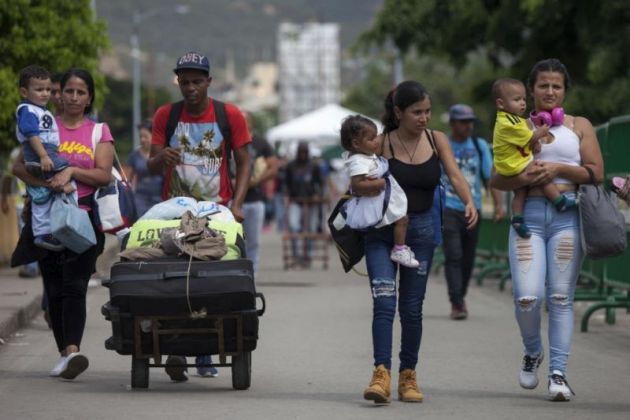Catholic diocese in Colombia has served 1 million meals to Venezuelan migrants

The Catholic Diocese of Cúcuta in Colombia says it has provided one million meals to Venezuelan migrants affected by the humanitarian crisis in their country.
The diocese on March 18 thanked the volunteers and donors who since June 5, 2017, have provided support to those affected by the emergency at the Colombian-Venezuelan border, Catholic News Agency reported.
"As the Holy Father Francis has well reminded us, the Church is like a field hospital where wounded people come seeking the goodness and closeness of God," Bishop Víctor Manuel Ochoa Cadavid said.
Venezuela has the largest proven oil reserves in the world and is not engulfed in conflict, The New Humanitarian reported on March 19.
Yet its people have been fleeing on a scale and at a rate comparable in recent memory only to South Sudanese or Syrians at the height of their civil wars and the Rohingya from Myanmar, said the crisis journalism portal.
Since Nicolas Maduro succeeded Hugo Chávez as president of Venezuela in 2013, the country has been marred by violence and social upheaval, CNA reported.
Under the government, which says it is socialist, hyperinflation and severe shortages of food, medicine, and other necessities, have afflicted the country and millions of Venezuelans have emigrated.
The United Nations High Commissioner for Human Rights, Michelle Bachelet had said on March 20 that the magnitude and gravity of the human rights impact of the current crisis in Venezuela is "a worrying destabilizing factor in the region."
VENEZUELA'S DETERIORATING HEALTH SYSTEM
She said that Venezuela's health system continues to deteriorate, with a very significant impact on maternal mortality and morbidity and infant mortality.
"The recent nation-wide electricity blackout has exacerbated this situation, further reducing people's access to food, water, and medication, and severely affecting hospitals," said the high commissioner.
Bachelet cited a recent survey, she also noted that more than 1 million children no longer attend school in Venezuela, mostly because of their parents' inability to feed them breakfast, the failure of schools' food programs, and a lack of affordable public transportation.
"Water shortages, scarcity of natural gas and the collapse of public transport also continue to affect many people, and together with hyperinflation, they generate dire economic conditions, which have triggered thousands of social protests," said the UN rights chief
Currently, thousands of Venezuelan citizens live on the remittances that relatives send them from abroad.
However, only a maximum of 6,000 bolivars a day can be withdrawn from the bank, which amounts to about US$2.00.
Many of those Venezuelans have fled to Colombia.
The Diocese of Cúcuta serves the migrants through the Divine Providence House of Transit in addition to eight parish soup kitchens.
Speaking on RCN Radio on March 19, Father David Cañas, the coordinator of the Divine Providence House, said that between 3,800 and 4,200 people arrive daily, starting very early, in search of food.
"Previously between 3,000 and 3,500 used to come (...) despite the blockades on the international bridges" that join Colombia and Venezuela, the priest said.
Bishop Ochoa voiced gratitude for "the 800 Catholic volunteers, men and women religious, priests and deacons, donors, coordinated by Father José David Caña Pérez, [who] make it possible for the Diocese of Cúcuta to become a prophetic witness of the charity of the Church."
"The Lord in his infinite goodness blesses the families of Cucuta through the generosity and availability which they have had since the beginning of the border crisis in order to serve their neighbor with love," he said.
Ochoa also thanked the institutions that have donated food, money, and resources to make the program possible: the World Food Program, the United Nations High Commissioner for Refugees, Caritas International, Adveniat, and the United States Conference of Catholic Bishops.
On March 19, in a meeting with migrants and volunteers at the Divine Providence House, Bishop Ochoa praised the 800 volunteers who have given their time to serve those in need.
"It's the work of the Catholic Church...it's the work of the Church for the beloved people of Venezuela... we ask you to pray for the people that help us help others."